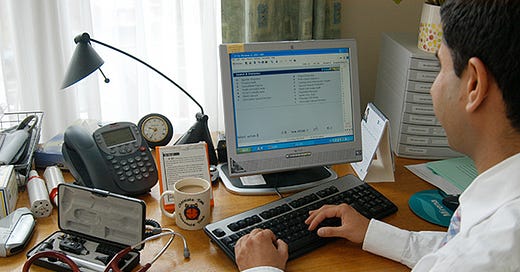Superpowering the clinician
It's time clinicians gained superpowers instead of being burnout by technology
Ironman, without the iron, is just a man. A human being who bleeds, who fears and who is physically incapable of saving the world from perhaps its last hope for existence. But man, with the iron or rather technology has the ability to save the world. Extreme I know but this is the opportunity I envisage for clinicians.
Doctors and nurses in healthcare are the most important assets in the healthcare system to enable healthcare. Period. Yet they are poorly supported with the tools to help them do more with less for all their patients. Technology is the greatest enabler for all people to do more with less. Yet the current technology supporting clinicians often forces them to do less and not more with what they have. I’m talking about here poorly designed electronic health records and medical devices that require often training to use.
Virtual care is the next medium of care for the majority of people in the world. With it brings an opportunity to create a better experience of healthcare for more people. The tools to enable virtual care are few and far between. Text, phone, email and video are current tools for this. None of these platforms or communication channels are designed for virtual care. The best technology systems are those designed for the task at hand. Virtual care needs its own technology system for its own important role in our society in the years to come.
In other industries, these dated channels of supporting customers (synonymous with clinicians supporting their patients) have evolved. Text is now chat, Phone is automated responses, Email is specific support questions, and video, well when was the last time you had a video call with someone you bought shoes from. In the workplace with your colleagues these platforms have also evolved, Text is now Slack, Phone is now WhatsApp or FaceTime, Email is now Superhuman, Video is over Zoom, Mircosoft teams, Google meet or other.
Text, Phone and Video consultations are the lowest hanging fruit of opportunity for virtual healthcare. The real opportunity is to leverage technology to redesign healthcare for patients without 'seeing' the doctor in person. Without relying on both the clinician and the patient to be available at exactly the same moment in time in order to provide care. This notion that healthcare can only happen when two people are both available to communicate is crazy. This is not about replacing the doctor! This about making the absolute most of the time you spend with your healthcare professional. Virtual care super-powered by the right technology system presents an opportunity to change this mentality and with it unlock a more affordable, scalable and more importantly effective healthcare system for everyone.
An asynchronous way of work is the first line of system change that technology has the power to enable. This also has happened to so many other industries. From collaborating with your colleagues via Trello, to customer support through Intercom, to setting up a bank account on Monzo, ordering food via Delieveroo, etc etc, the list continues. So too will an asynchronous approach to care becomes the norm in healthcare. If executed properly this asynchronous approach will create more structured data, which when properly utilised will unlock a better, faster more effective opportunity to triage but also proactively follow up patients for further review. This proactivity of care will allow the system to prevent and better manage more than it treats.
Unlocking this structured data that matches the patient-reported health status, clinical results and the clinician’s actions via a feedback loop allows us to use machine learning to optimise this relationship. To help the clinician understand the phenotype of the condition this patient is suffering from, the best approach for care based on the last 10,000 patients her or her colleagues have treated and when next to check back in. For the patient, they are reassured that the clinicians have the most updated accurate tools and information to act in their best interest with the most up to date understanding of themselves and what management or treatment might work for them.
Building intelligence from asynchronous review and management of patients is such a game-changer versus EHR data because EHR data is a reflection of the doctor’s perspective of care ONLY. It misses the natural back and forth between clinician and patient but most importantly misses the patient’s self-view of their health - in their own words.
Virtual healthcare is the new medium for healthcare for the majority of the world. At the core of this is super powering the clinician. Technology is human beings’ greatest enabler. Providing services that bring the best technology and support for virtual care to clinical teams across the world, to scale care enough to meet the volume and complexity of healthcare demands, is our hope at Suvera.




